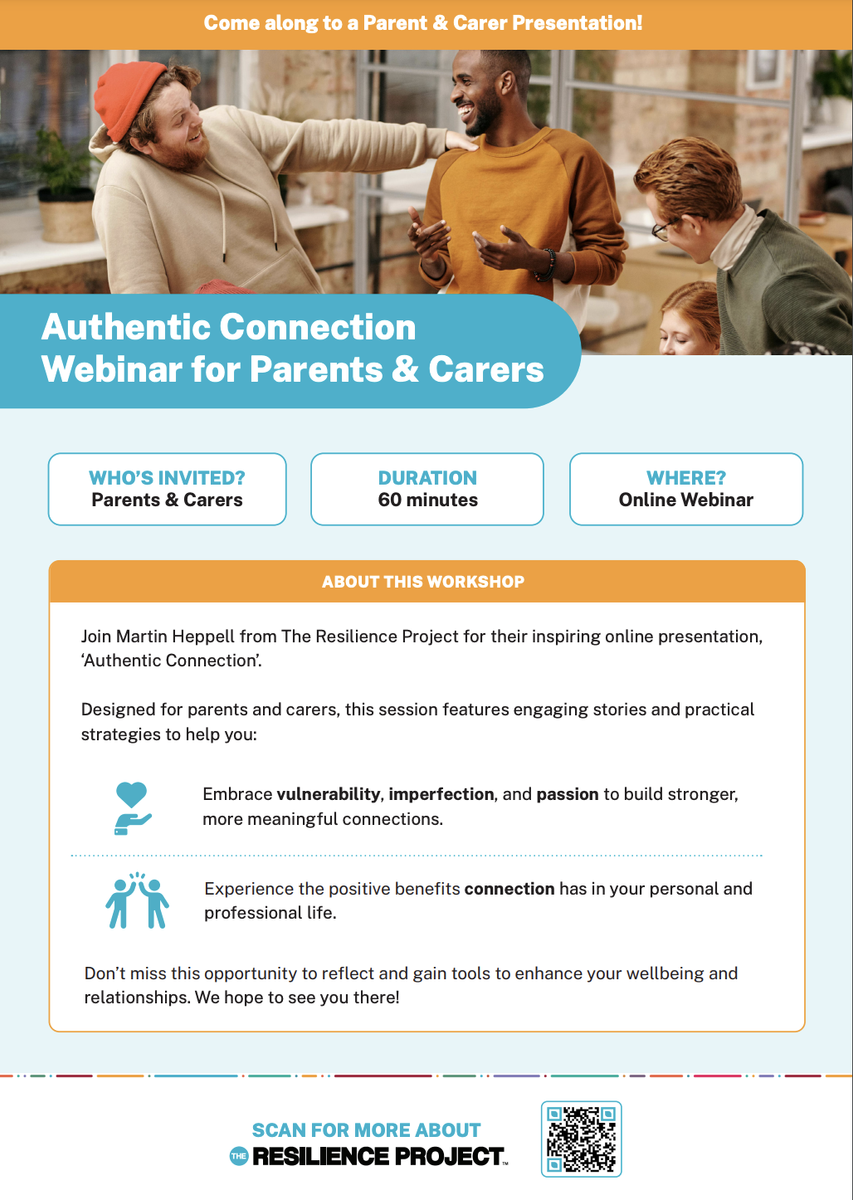Wellbeing
Martina and Maya

Wellbeing
Martina and Maya
Authentic Connection for Parents and Carers Webinar with Martin on Tuesday 20th May, 6:30-7:30pm (60 minutes) AEST.
Thanks to families who have paid their school fees - your contributions allow us to engage with parent sessions such as these through our partnership with The Resilience Project.
What will it be about?
The biggest impact happens when we work together. This one hour session combines cutting edge research with candid storytelling to help parents and carers understand the benefits of letting go of shame, perfection, ego and control. It then shares the same evidence-based strategies being taught in your classrooms so they can be practised at home (and beyond!).
How to register?
Register for the webinar using the link below.
https://forms.theresilienceproject.com.au/single-event-confirmation/?event_id=419168


FUNctioning Skill #1: Sustained Attention
What we’re working on this month: Sustained Attention
This is the ability to stay focused on something long enough to finish it—whether it’s building a Lego spaceship, packing a schoolbag, or writing a story.
It’s not about being perfect or never distracted. It’s about noticing when attention drifts and gently coming back.
Why it matters:
When kids can stay focused, they feel more successful, less frustrated, and proud of what they can do. It helps with reading, writing, friendships, problem-solving—and even playing independently.
Signs your child might be developing this skill — or might need extra practice:
This is completely normal! These are developmental skills that strengthen with practice, just like muscles.
How you can help at home (in fun, natural ways).
Here are some easy ways to stretch this skill in daily life:
Chores that build sustained attention:
Games that build Sustained Attention
Choose one or two that fit your family—whatever feels doable and fun.
Final Note
You don’t need a perfect routine or a magic formula.
Just more chances, more play, more presence.
With love and little tweaks, kids get stronger at things we can’t always see right away.
This is parenting at its best: real, responsive, and quietly powerful.
We’re with you.
Let’s keep growing together.
**************************************************************************************************
Learning Doesn’t Always Happen in a Straight Line
At primary school, children’s learning and growth can look very different from one student to another. It’s important to remember that learning isn’t always linear. Sometimes it moves quickly, sometimes it slows down and sometimes it might seem like students are taking a step backwards. All of this is completely normal!
Children tend to make faster learning progress in the early primary years because their brains are growing quickly and they are developing important foundation skills like reading, writing and counting for the first time. As they move into the senior primary years, their learning continues but it becomes more focused on building deeper understanding and tackling more complex ideas. This can take more time and may seem slower, even though they are still making progress.
Learning is influenced by many factors such as prior knowledge, social and emotional development and individual learning styles. Because of this, children might suddenly make big improvements, stay at the same level for a while or take time to really understand a new idea.
Research helps us understand this concept better:
Child development experts tell us that children grow and learn in stages. These changes can be linked to how their brains develop and the fact each child learns in their own way.
Studies in brain science and early childhood learning show us that learning is often shaped by a child’s experiences and the world around them and not just what happens in the classroom.
The 'Zone of Proximal Development' (ZPD) refers to the gap between what a child can do independently and what they can do with support. We call this being in “the learning pit” - a place where children might feel challenged but where deep learning happens.
John Hattie’s research reminds us that there are different phases of learning; acquiring surface knowledge, consolidating it, developing deeper understanding and transferring knowledge to new contexts. Children will spend different amounts of time in each stage of learning depending on the concept.
When we understand that learning is not a race or a straight line, we can focus more on long-term growth. With encouragement, support and patience, both at home and at school, children will continue to grow at their own pace while gaining confidence, resilience and the skills needed to be a lifelong learner.
In the next newsletter, we will share more about how we communicate student’s learning growth at BBPS, including information about the upcoming Three Way Conferences.
Kirsten Braun Year 5 classroom teacher